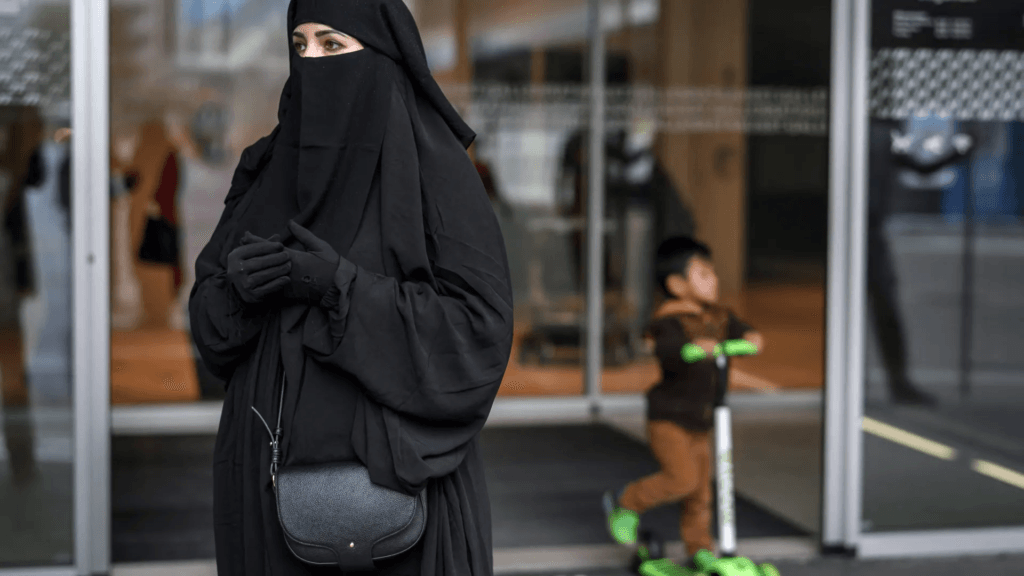Switzerland Enforces Facial Covering Ban & Raises Pensions in the New Year
Switzerland has recently enforced a controversial facial covering ban while simultaneously raising pensions in the new year. These decisions have sparked significant attention both within the country and internationally. The Swiss government’s actions are seen as part of broader efforts to balance public security concerns with economic welfare, with the pension hike aimed at supporting citizens’ livelihoods during a period of rising inflation and financial challenges.
Facial Covering Ban – A Controversial Move
Switzerland has introduced a nationwide ban on facial coverings, including burqas and niqabs, following an extensive public debate about security and cultural integration. The ban, which will be enforced in public spaces, is aimed at ensuring that individuals’ faces remain visible for identification purposes. Supporters of the law argue that it enhances safety and upholds Swiss values, while critics view it as discriminatory against Muslim women and a violation of religious freedoms.
The law has generated mixed reactions, with some seeing it as an infringement on personal freedoms and others considering it necessary to address security concerns. The move also aligns with similar bans in other European countries, which have sparked debates on how to balance individual freedoms with national security in an increasingly multicultural society.
Pension Increase – A Positive Step for Swiss Citizens
In contrast, Switzerland’s decision to raise pensions in the new year is a more widely supported measure. The government has announced an increase in pension payouts to help offset the economic challenges faced by elderly citizens, particularly due to rising inflation rates and the economic impact of the pandemic. This pension hike is part of the Swiss government’s broader plan to ensure social welfare for its aging population and promote economic stability.
The pension increase is expected to provide much-needed financial relief to retirees, many of whom are struggling to maintain their standard of living amidst higher costs. The Swiss government’s move reflects its commitment to ensuring that senior citizens are not left behind as the country navigates through economic uncertainties.

Why This News is Important
Impact on Swiss Society
The enforcement of the facial covering ban and the pension increase are two crucial developments in Switzerland’s social and political landscape. The facial covering ban has sparked debates surrounding freedom of expression, religion, and security, especially in a multicultural society where these issues are often contentious. This law may have broader implications for other European nations considering similar measures.
On the other hand, the pension increase is a key step in addressing the needs of Switzerland’s elderly population, who have been particularly vulnerable to economic shifts. With rising inflation and an aging population, the pension hike is an essential tool to maintain social stability and ensure that citizens can enjoy a reasonable standard of living in their retirement years.
Broader European Context
Both the facial covering ban and pension increase must be viewed in the context of ongoing political and economic trends across Europe. Many countries are grappling with how to balance integration policies with respect for cultural diversity, while also addressing the financial challenges of an aging population. These two policies reflect broader societal efforts to navigate the complexities of national security, personal freedom, and economic welfare.
Historical Context: Background Information on Switzerland’s Policies
Switzerland has historically been a leader in direct democracy, allowing its citizens to vote on important issues through referendums. The facial covering ban was introduced after a referendum in which Swiss citizens voted in favor of the law, reflecting the country’s commitment to direct democratic decision-making. The law is part of a wider European trend of enforcing similar bans, with countries such as France, Belgium, and the Netherlands also implementing similar measures.
The pension increase, on the other hand, is part of a long-standing tradition of ensuring the welfare of Switzerland’s elderly population. The Swiss pension system is considered one of the most robust in the world, and this recent increase in pension payouts comes after years of planning and adjustments aimed at addressing the economic challenges posed by an aging population and fluctuating market conditions.
Key Takeaways from Switzerland Enforces Facial Covering Ban & Raises Pensions
| S.No | Key Takeaway |
|---|---|
| 1 | Switzerland has enforced a nationwide facial covering ban, which includes burqas and niqabs, in public spaces to enhance security. |
| 2 | The law has sparked debates over the balance between individual freedoms, cultural integration, and national security in Switzerland. |
| 3 | In the same period, Switzerland has raised pensions to provide financial relief to elderly citizens amid rising inflation and economic challenges. |
| 4 | The pension increase is part of the Swiss government’s broader effort to support the aging population and ensure financial stability for retirees. |
| 5 | Both measures reflect broader European discussions on security, personal freedoms, and welfare for an aging population. |
Important FAQs for Students from this News
What is Switzerland’s facial covering ban?
- Switzerland’s facial covering ban prohibits individuals from wearing full-face coverings, such as burqas and niqabs, in public spaces. The law aims to enhance security by ensuring that people’s faces remain visible for identification.
Why was the facial covering ban implemented in Switzerland?
- The ban was implemented to improve public safety and uphold Swiss values. It was introduced after a public referendum in favor of the law, aligning with similar bans in other European countries.
What impact does the facial covering ban have on Swiss society?
- The ban has sparked debates about freedom of religion and personal expression. It raises questions about balancing security with cultural diversity, particularly for Muslim women who wear facial coverings for religious reasons.
How does Switzerland’s pension increase affect its citizens?
- Switzerland raised pensions to provide financial support to retirees, particularly to help them cope with rising inflation. This increase is part of a broader effort to maintain the financial stability of the aging population.
How does Switzerland’s pension system work?
- Switzerland has a robust pension system that includes public, occupational, and private pension schemes. The recent increase in pensions is aimed at ensuring that elderly citizens are financially supported as they deal with economic challenges.
Some Important Current Affairs Links

















